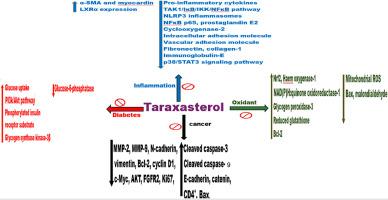Pharmacological relevance of taraxasterol: A review
Pharmacological Research - Modern Chinese Medicine
Pub Date : 2024-10-19
DOI:10.1016/j.prmcm.2024.100533
引用次数: 0
Abstract
Introduction
Taraxasterol is a pentacyclic triterpenoid which was first discovered from the roots of Taraxacum officinale. However, it is generally found in the Taraxacum genus (Pugongying in Chinese). It has been reported to possess several medicinal properties, and modulate several biochemical and metabolic signaling pathways as a means of exerting its pharmacological effects. Even though some biological effects have been ascribed to taraxasterol, it is still being explored for more therapeutic benefits. This review aimed to highlight the relevance of taraxasterol as an antidiabetic, anti-cancer, anti-inflammatory and an antioxidant agent.
Methods
Articles for this review were searched on Scopus, Nature, SpringerLink and PubMed databases. The keywords used for the search were “taraxasterol pharmacology”, “taraxasterol antioxidant”, “taraxasterol cancer”, “taraxasterol biosynthesis” and “taraxasterol antidiabetic”. Relevance and report of distinct mechanisms of action were considered in the selection.
Results
This review underlines the therapeutic potential of taraxasterol in cancer and diabetes conditions, while also highlighting its anti-inflammatory and antioxidant effects. Some specific biochemical pathways that are modulated due to the pharmacological effect of taraxasterol were diagrammatically represented.
Conclusions
It is hoped that this review would stimulate interest in taraxasterol by focusing on its pharmacological relevance, specific mechanisms of action and pharmacokinetics. This might facilitate its eventual development into drug and adoption into treatment regimen of various diseases.

蒲公英甾醇的药理作用:综述
引言 蒲公英甾醇是一种五环三萜类化合物,最早是从蒲公英的根中发现的。不过,它一般存在于蒲公英属植物中。据报道,它具有多种药用特性,并能调节多种生化和代谢信号通路,从而发挥药理作用。尽管一些生物效应已被归因于蒲公英甾醇,但人们仍在探索其更多的治疗功效。本综述旨在强调蒲公英甾醇作为抗糖尿病、抗癌、抗炎和抗氧化剂的相关性。方法本综述的文章在 Scopus、Nature、SpringerLink 和 PubMed 数据库中进行检索。搜索关键词为 "蒲公英甾醇药理学"、"蒲公英甾醇抗氧化剂"、"蒲公英甾醇抗癌"、"蒲公英甾醇生物合成 "和 "蒲公英甾醇抗糖尿病"。本综述强调了蒲公英甾醇在癌症和糖尿病方面的治疗潜力,同时还强调了其抗炎和抗氧化作用。结论希望这篇综述能激发人们对蒲公英甾醇的兴趣,重点关注其药理相关性、特定作用机制和药代动力学。希望这篇综述能激发人们对蒲公英甾醇的兴趣,重点关注其药理相关性、具体作用机制和药代动力学,这将有助于蒲公英甾醇最终发展成为药物,并被纳入各种疾病的治疗方案。
本文章由计算机程序翻译,如有差异,请以英文原文为准。
求助全文
约1分钟内获得全文
求助全文

 求助内容:
求助内容: 应助结果提醒方式:
应助结果提醒方式:


